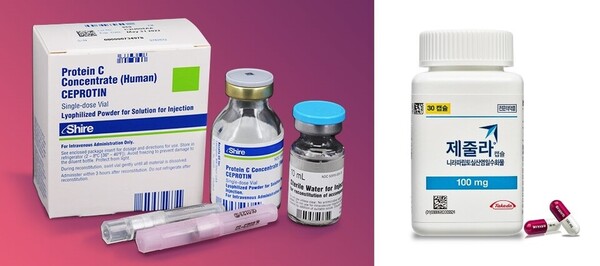Ceprotin (protein C concentrate), an ultra-rare disease treatment developed by Takeda Pharmaceutical Korea, has passed the Pharmaceutical Reimbursement Evaluation Committee (PREC) review, passing the 80 percent mark in getting insurance coverage.

Takeda Pharmaceuticals Korea also overturned the outcome of the previous review by filing an objection against PREC, which rejected the expansion of the reimbursement standard for Zejula (niraparib) last month.
On Thursday, the Health Insurance Review and Assessment Service (HIRA) released the results of this year's sixth PREC review.
At the meeting, the committee reviewed new reimbursement for Ceprotin and expanded reimbursement for Zejula applied by Takeda Pharmaceutical Korea.
Ceprotin won recognition for its appropriateness for reimbursement for treating venous thrombosis and fulminant purpura in patients with congenital protein C deficiency.
Protein C deficiency is a blood clotting disorder prone to blood clots, and congenital protein C deficiency is a genetic disorder caused by a genetic defect that results in the human body's inability to make protein C, one of the body's naturally occurring thrombolytic agents.
It is an extremely rare genetic disease that affects one in 4 million newborns, and only a few dozen patients have been reported in Korea (13 according to the National Statistics Portal in 2019).
So far, there is no drug remedy that can prevent or completely control venous thrombosis and fulminant purpura in patients with severe congenital protein C deficiency.
Ceprotin, a human protein C concentrate, was designated as an orphan drug by the Ministry of Food and Drug Safety (MFDS) in March 2021 and won marketing authorization in August 2022.
Now that Ceprotin has passed the PREC review, it must negotiate the drug price with the National Health Insurance Service (about 60 days) and vote at the Health Insurance Policy Deliberation Committee of the Ministry of Health and Welfare.
The committee also re-discussed the proposal to expand Zejula's coverage, overturning the result of the fourth PREC meeting, which concluded that the appropriateness of expanding coverage was unclear.
Takeda Pharmaceutical Korea had requested to expand Zejula’s reimbursement, now limited to BRCA mutation patients, to include HRD-positive patients for first-line maintenance therapy for unresectable ovarian cancer.
However, the proposal was rejected at the fourth PREC meeting in April, and the company appealed the decision, which was reviewed two months later.
Zejula won the original MFDS approval as an “all-comer” for first-line maintenance therapy for unresectable ovarian cancer. Still, its reimbursement was limited to BRCA mutation-positive patients, who account for only about 30 percent of the total.
If Takeda Pharmaceutical Korea completes the remaining reimbursement process and expands the eligibility criteria for Zejula to "HRD-positive" patients, coverage is expected to expand to about 50 percent of the total.
Meanwhile, BMS Korea's application for the new reimbursement of Camzyos (mavacamten) was notified of a “reconsideration.”
Camzyos won MFDS’ approval in May last year for “treating adult patients with symptomatic (NYHA class II-III) obstructive hypertrophic cardiomyopathy to improve exercise function and symptoms.” The drug made its first attempt for coverage at Thursday’s meeting.

